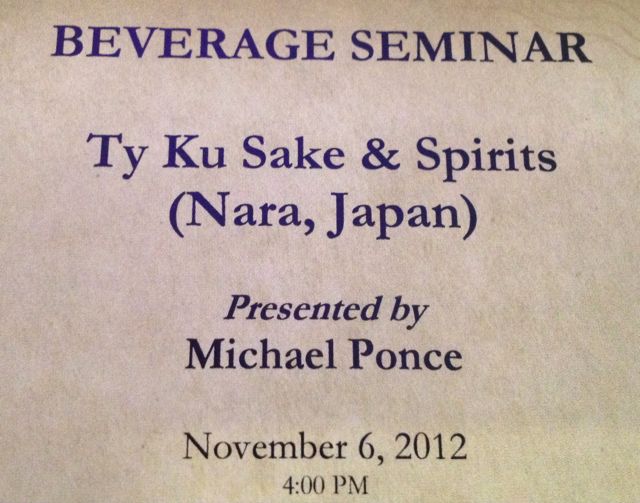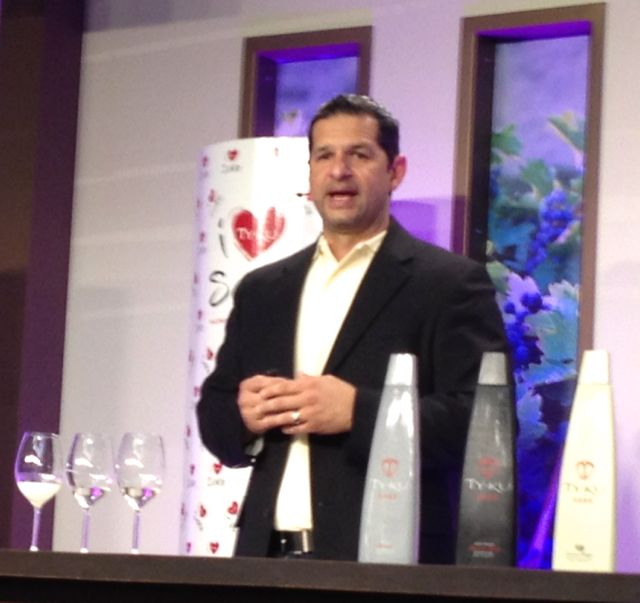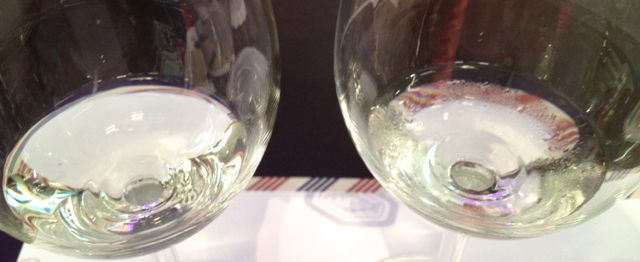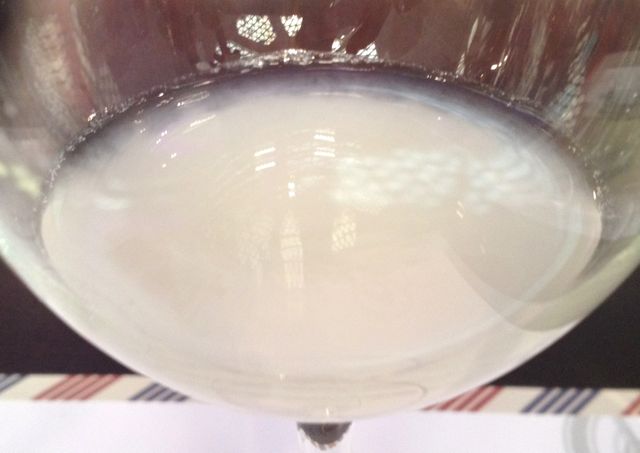Ty Ku Sake & Spirits – Nara, Japan
Michael Ponce, Presenter
Ty Ku Silver Premium Junmai, Ty Ku Black Super Premium Junmai Ginjo, and Ty Ku coconut Nigori Premium Cloudy
November 6, 2012
One of the best things about the Ty Ku presenter, he was very willing (in fact, he was encouraging) to answer questions throughout the presentation and not making everyone wait until the end.
Unfortunately, his presentation slides seemed to be created by someone else and he seemed uncomfortable/unfamiliar with them. To his credit, he did an excellent job explaining some basic sake knowledge in terms that even a sake-novice could understand and absorb.
- Drinking temperature
- For the most part, heated sakes aren’t that good… they’re heated to hide impurities
- Sakes is like a white wine, it should be poured cold/chilled and allowed to slowly come up in temperature… it loses flavors if served too cold
- Preferred vessel for premium sakes = a wine glass
- Junmai sake is made of water, rice, koji, and yeast… the term “junmai” denotes “pure” or “all natural”
- Thus, junmai sake has no tannins, no sulfites, and no gluten
- Ty Ku is the most decorated sake in the world
- Enjoy chilled
- Drink young
- Ranges from dry to sweet
- Pairs with more than sushi
- Ty Ku used to be made in Portland, Oregon – but the water there had an iron content that was too high for the sake (the less iron in the water the better tasting the sake)
- Sake has about a two year shelf life; you should refrigerate after opening (Joe Andade from Swan and Dolphin says that it will “keep” in the refrigerator for about 1 week)
- Ty Ku replaces store stock if it becomes too old
- SMV = Sake Meter Value, ranges from -4 to +4
-
- -4 is sweetest
- 0 is neutral
- +4 is driest
Question: How is sake rice different from regular rice? Michael says sake rice is different in that it has to withstand the milling/polishing process. Nora thinks it a different rice altogether and you wouldn’t want to eat it. Further investigation on the internet… sake school and wikipedia… Both answers are correct, in sake rice the starch is separate from the proteins and fats that makes it possible to mill/polish it AND it is unpalatable.
Tasting Notes:
First off, the Silver and Black Ty Ku Sakes are made in the same brewery, using the same water, the same rice (Akebono), the same koji, and the same yeast. So, why are they different? It’s the gradation of polishing… Ty Ku Silver rice grains are polished 30% and the Ty Ku Black rice grains are polished 45%.
Nick directly compared the Silver and the Black, Nora tasted all of the sakes once and then went back and tasted them again… Our notes follow…
Ty Ku Silver Premium Junmai
- Price point is $20-$25 per bottle
- Ty Ku’s tasting notes: fresh and lightly sweet with subtle pear notes
- nora’s notes
- first nose = fresh, crisp
- first taste = slightly fleshy, meaty?
- second nose = fruitier
- second taste = lighter
- third nose = meaty again
- third taste = a little creamier
Ty Ku Black Super Premium Junmai Ginjo
- Price point is $25-$30 per bottle
- Ty Ku’s tasting notes: rich texture, peach on the nose with a subtle hint of spice
- nora’s notes
- first nose = spicy slightly, stone fruit
- first taste = lighter, fruitier
- second nose = spicy
- second taste = not as pleasant
- third nose = zingier
- third taste = slightly herby, maybe even medicinal
Nick’s direct comparison of Silver and Black Ty Ku Sake
- Silver definitely smells sweeter than black
- Nosed side by side, the fruits are not pronounced
- Silver definitely tastes lightly sweet
- Black is not dry but not sweet – more sense of alcohol on the tongue
- 4 sips of each – prefer the Silver for just drinking
- Guess that Black will pair better with sushi – that would be a nice experiment to try
Ty Ku Coconut Nigori Premium Cloudy
- This isn’t as cloudy as most nigori sakes
- Price point $25-$25 per bottle
- Ty Ku’s tasting notes: “Ty Ku Coconut Sake has a silky texture with the refreshingly sweet taste of coconut and hints of vanilla. Enjoy like a white wine, chilled in a wine glass or in a delicious premium nigori sake cocktail. Shake before serving, refrigerate after opening and for best taste, enjoy soon thereafter. Not just for sushi, Ty Ku Coconut Sake pairs well with a wide variety of cuisine.”
- nora’s notes:
- first nose = definite coconut
- first taste = coconut taste not as strong as expected, not great though
- second nose = eh…
- second taste = not as tasty
- nick’s notes:
- smells sweet sweet sweet coconut
- too sweet to call sake
- you could pour this over a dry cake dessert to sweeten and moist the cake
- not something I would drink, but might enjoy it if a pastry chef used in a dessert – then maybe the sake would pair with the dessert
Our Verdict…
- Nora says that she thinks she preferred Ty Ku better when it was still brewed in Portland, Oregon. There are so many good sakes available now, this wouldn’t be a brand she’d immediately gravitate to
- Nick agreed that there are other sakes to try in most circumstances and this brand isn’t going to be the default sake for him either




You must be logged in to post a comment.